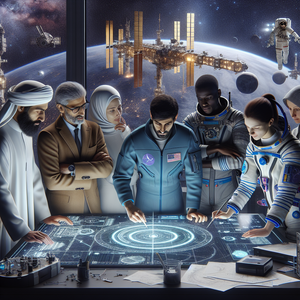The Role of Houston in Space Exploration

Houston's journey into the cosmos began with the establishment of the Manned Spacecraft Center (now known as the Johnson Space Center) in the early 1960s. This facility became the hub for human spaceflight in the United States, responsible for training astronauts and managing various space missions. The Apollo program, particularly Apollo 11's moon landing in 1969, showcased Houston's expertise. The city was home to NASA's mission control, where flight controllers meticulously guided astronauts through the complexities of space travel, ensuring their safety and success. The legacy of Apollo is woven into the fabric of Houston, where many of the engineers and scientists who contributed to the program still share their experiences. According to Dr. Ellen Ochoa, the first Hispanic woman in space and former director of Johnson Space Center, "Houston was the heartbeat of human spaceflight, where dreams turned into reality." Her words encapsulate the enthusiasm and dedication that have characterized the city's aerospace community.
Key Players in Houston's Aerospace Landscape
Several aerospace companies have established themselves as integral components of Houston's space exploration narrative. SpaceX, founded by Elon Musk, has made headlines with its ambitious goals of colonizing Mars and revolutionizing space travel. With a significant presence in Houston, SpaceX collaborates with NASA on the Commercial Crew Program, which aims to transport astronauts to the International Space Station (ISS). The company’s innovative approach to reusable rockets is reshaping the economics of spaceflight, making it more accessible. Another notable player is Boeing, which has been instrumental in the development of the Space Launch System (SLS) for NASA's Artemis program. The Artemis missions aim to return humans to the Moon and eventually send astronauts to Mars. Boeing's expertise in aerospace engineering and its long-standing relationship with NASA position it as a key partner in these ambitious endeavors. Lockheed Martin, a titan in the aerospace industry, also has a significant presence in Houston, particularly in developing the Orion spacecraft designed for deep-space exploration. The collaboration between these companies and NASA exemplifies the synergy that defines Houston's aerospace ecosystem. In addition to these giants, the Houston area is home to several other aerospace companies, including Blue Origin, focused on suborbital and orbital spaceflight; Northrop Grumman, which plays a role in the development of the Cygnus spacecraft for ISS resupply missions; and Aerojet Rocketdyne, known for its propulsion systems. Each of these companies contributes to the rich tapestry of Houston's aerospace landscape, ensuring the city remains at the forefront of space exploration.
Innovative Contributions and Future Missions
Houston's involvement in space exploration is not merely historical; it continues to evolve. As NASA prepares for the Artemis missions, the city plays a crucial role in the development of new technologies and exploration strategies. The Artemis I mission, which successfully tested the Space Launch System and the Orion spacecraft, has set the stage for future lunar missions, with the goal of establishing a sustainable human presence on the Moon by the end of the decade. Moreover, Houston's aerospace community is fostering innovation through partnerships with startups and educational institutions. Initiatives like the Houston Spaceport, which focuses on commercial spaceflight and research, are paving the way for new opportunities in the aerospace sector. By providing a platform for collaboration, these initiatives are attracting talent and investment, ensuring that Houston remains at the forefront of space exploration. The city is also home to numerous educational institutions, including the University of Houston and Rice University, which offer aerospace engineering programs that nurture the next generation of space exploration experts. Collaborations between academia and industry further enhance innovation and research, positioning Houston as a leading hub for aerospace education and development.
Houston's role in space exploration is a testament to its rich history, innovative spirit, and collaborative culture. As the city continues to evolve with the challenges and opportunities presented by modern space missions, it remains a critical hub for aerospace advancements. The stories of the pioneers who paved the way for space travel, coupled with the transformative work being done today, highlight Houston's enduring legacy in the quest for knowledge beyond our planet. With the upcoming Artemis missions and the promise of new technologies, Houston is poised to maintain its status as a leader in the exploration of the final frontier. As we look to the stars, it is clear that Houston will continue to play a pivotal role in shaping the future of space exploration for generations to come.
Aerospace Systems Engineer
NASA, Boeing, Lockheed Martin, SpaceX
Core Responsibilities
Design and analyze aerospace systems for space missions, including spacecraft and launch vehicles.
Collaborate with cross-functional teams to ensure systems meet safety, performance, and reliability standards.
Conduct simulations and testing to validate system performance under various conditions.
Required Skills
Proficiency in systems engineering principles and tools (e.g., Model-Based Systems Engineering).
Strong analytical and problem-solving skills, with experience in aerospace analysis software.
Familiarity with NASA regulations and aerospace industry standards.
Flight Operations Director
NASA, Northrop Grumman, SpaceX
Core Responsibilities
Oversee the planning and execution of flight operations for manned and unmanned space missions.
Coordinate with mission control, engineering teams, and astronauts to ensure mission success.
Develop and implement operational procedures and contingency plans for various mission scenarios.
Required Skills
Extensive experience in aerospace operations or mission control environments.
Strong leadership and communication skills to manage diverse teams under pressure.
Knowledge of flight dynamics and mission planning tools.
Space Robotics Engineer
NASA, SpaceX, Blue Origin
Core Responsibilities
Design and develop robotic systems for space exploration, including rovers and robotic arms.
Test and validate robotic systems in simulated space environments.
Collaborate with scientists and engineers to integrate robotic technology into missions.
Required Skills
Proficiency in robotic programming languages (e.g., ROS, Python) and mechanical design software (e.g., CAD).
Experience in robotic kinematics, dynamics, and control systems.
Familiarity with space mission requirements and constraints.
Orbital Mechanics Specialist
NASA, Boeing, Lockheed Martin
Core Responsibilities
Analyze and optimize trajectories for spacecraft launching to various destinations, including Earth orbit and beyond.
Conduct mission analysis to support launch vehicle and spacecraft design decisions.
Provide expertise on orbital dynamics, spacecraft rendezvous, and docking operations.
Required Skills
Strong understanding of celestial mechanics and orbital dynamics principles.
Proficiency in software tools for simulation and analysis (e.g., MATLAB, STK).
Experience with mission planning and trajectory optimization for space missions.
Spacecraft Systems Integration Engineer
NASA, SpaceX, Lockheed Martin, Northrop Grumman
Core Responsibilities
Manage the integration of various subsystems within spacecraft to ensure cohesive functionality.
Develop integration and testing plans for spacecraft components and systems.
Troubleshoot and resolve integration issues, ensuring compliance with mission specifications.
Required Skills
Strong background in electrical, mechanical, or software engineering, with experience in spacecraft systems.
Excellent project management skills to coordinate multiple teams and timelines.
Understanding of spacecraft design lifecycle and testing methodologies.


